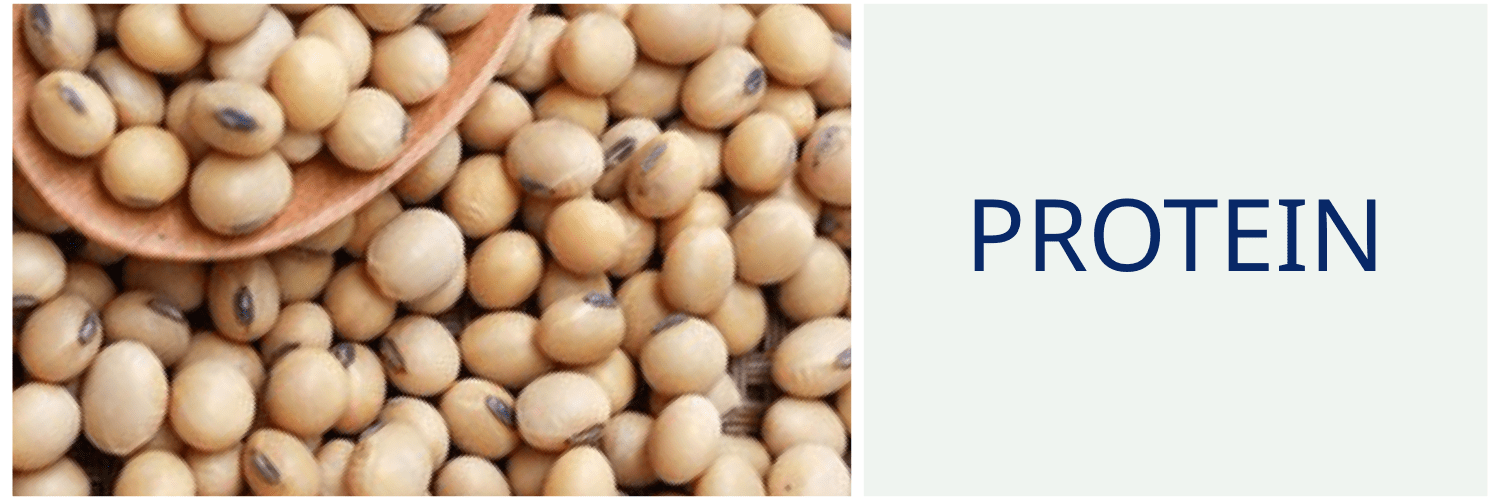

WHAT IS THE DIFFERENCE BETWEEN WHEY PROTEIN AND CASEIN PROTEIN?
Casein protein constitutes 80% of milk protein. Casein protein is slow to digest, coagulates in the stomach, and appears to be anti-catabolic due to this effect.
Whey protein is a natural byproduct of the cheese-making process. About 20% of protein found in milk is whey protein. Whey protein typically contains cholesterol.
WHAT IS THE DIFFERENCE BETWEEN SOY ISOLATE AND WHOLESOME SOY?
Soy isolate is a dry powder food ingredient that has been isolated from soybeans.
Wholesome soy can be considered as one of the healthiest options among plant proteins. Wholesome soy contains more useful components than soy isolate. Wholesome soy contains soy protein, essential vitamins, minerals, as well as fiber, antioxidants, and phytochemicals. All of these are essential for the optimal health of your body.

WHICH IS HEALTHIER? PLANT PROTEIN OR ANIMAL PROTEIN?
Protein derived from animal sources, such as whey protein and casein protein, tends to contain higher levels of fat and cholesterol than plant protein. Protein from plant sources, such as soy protein, on the other hand, does not contain animal fats and cholesterol.
Research regarding soy protein and cardiovascular health has become so robust that it was awarded a health statement by the US Food and Drug Administration (FDA)—“25 grams of soy protein a day, as part of a diet low in saturated fat and cholesterol, may reduce the risk of heart disease.”
IN SPITE OF ALL THE HEALTH BENEFITS, THERE HAS BEEN SOME CONTROVERSY OVER SOY PROTEIN. CAN THE PHYTOESTROGENS IN SOY HARM THE BODY?
Soy contains many phytoestrogens, for example: isoflavones, phytosterols, saponins, coumestans, and lignans. Isoflavones are present in a wide variety of plants, such as berries, grains, and nuts, but are the most ample in soybeans. Phytoestrogens are associated with multiple protective effects against cancer, heart disease, and bone weakness.
The FDA has released a statement reporting that concerns regarding phytoestrogens contributing to cancer have no support from conclusive scientific research. The compounds in soy have little effect, and the impact is very limited and much lower than that of your natural or even synthetic hormones.
Phytoestrogens do not cause cancer, rather, evidence suggests they protect against cancer.
IS ANIMAL PROTEIN BETTER ABSORBED BY THE BODY COMPARED TO SOY PROTEIN?
Soy is an excellent source of protein. Soy protein is one of the plant-based proteins that is considered “complete”—it is a high quality protein containing all of the essential amino acids needed to support human growth and development.
The Food and Agriculture Organization of the United Nations and the World Health Organization have jointly made recommendations that led to the development of the now preferred Protein Digestibility Corrected Amino Acid Score (PDCAAS). This score measures the protein value in human nutrition based on a variety of data, including how well different areas of the digestive system absorb critical components of protein. When this accurate scale is used, soy protein scores 1.00—the highest possible rating, equivalent to that of animal protein.
In addition to protein, soy also provides desirable potassium, zinc, iron, and vitamins.

MANY PEOPLE NOW SUFFER FROM DIABETES AND NEED TO TAKE CARE OF THEIR HEALTH. WHAT TYPE OF PROTEIN WILL NOT DAMAGE THE KIDNEYS, ESPECIALLY IN DIABETICS?
The American Diabetes Association recommends that one of the best proteins for diabetic kidneys is plant-based protein, such as soy, as it “provides quality protein, healthy fats and fiber.”
Research shows that substitution of soy protein for animal protein in diabetics results in protection of the diabetic kidneys from nephropathy. The positive effects of soy on kidney function apply to people with and without abnormal kidney function, and diabetic and non-diabetic individuals.
Research suggests that substituting soy protein for animal protein in diabetes patients results in less hyperfiltration and glomerular hypertension and, therefore, resultant protection from diabetic nephropathy.
References can be found at www.eleadglobal.com.